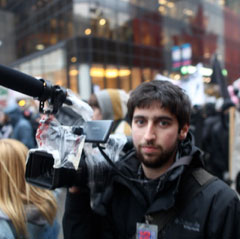Did you know that Truthout is a nonprofit and independently funded by readers like you? If you value what we do, please support our work with a donation.
Filmmaker David Zlutnick talks about his new documentary “Occupation Has No Future,” which focuses on Israeli militarism and explores the work of Israelis and Palestinians organizing against the occupation.
Leslie Thatcher for Truthout: David, the aspect of your film that I particularly appreciate is its focus on how Israeli society has been pervaded and perverted by militarism. What was the genesis of that focus?
David Zlutnick: The Israeli-Palestinian conflict is one that has been explored from a huge variety of perspectives, focusing on a diversity of subjects. However, after spending years following events in the region, there were still certain voices I hadn't yet heard, at least not in any accessible manner: the voices of Israelis who are firmly against the occupation of Palestinian land, the treatment of Palestinians, and the aggressive and militarized nature of Israeli society in general. As someone who paid close attention to events in Israel/Palestine, I found it surprising that this perspective was so hard to find. Yes, it is available if you really search for it, but for most people – who are only paying marginal attention to developments as they see them on CNN, or in the New York Times, or other similar sources or perhaps very biased sources – that perspective is completely missing. And I thought, “If I don't see the faces or hear the words of these Israelis, who has?”
So the primary goal of this project was to present an alternative narrative to the discussion around the issue; to show that there is a Jewish-Israeli opinion contrary to the prevailing discourse framing the debate as one of “security vs. terror” that forces critics to choose to be either pro- or anti-Israel, pro- or anti-Jewish, that, instead, puts it in terms of human rights and envisioning what type of society people want to see – for Palestinians, but also for Israelis. However, even beginning to look at how these individuals broke with the dominant narrative means it's necessary to explore what forces drive Israeli society and how such a consensus of opinion around the occupation and more generally Zionism itself is formed. And that exploration leads to the state's heightened militarism, and really how the military pervades Israeli society – how it is present in the education system, how conscription works, etc.
Of course this is not the only perspective that is underrepresented and it is not the sole focus of the film. A good part of the documentary looks at the occupation itself through both the eyes of Palestinians living under it, and former soldiers who enforced it, but are now organizing against it. And the audience hears a good amount from Palestinian organizers of the grassroots civil resistance movement against the separation wall in the West Bank and learns about the partnership between Israeli and Palestinian activists.
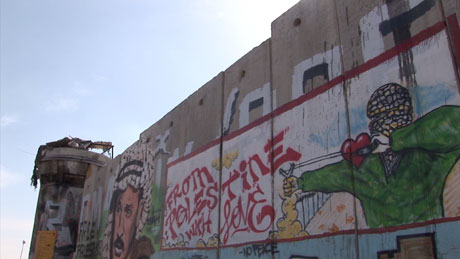
Graffiti covers a section of the separation wall outside Ramallah, Occupied West Bank.
LT: Talk a little bit about the consequences for Israeli Jews of resisting that militarization.
DZ: There are several ways that this happens, and there's a lot to say on this. We'll start with Israelis who refuse conscription or refuse to continue service. There are legal reasons that Israelis can be exempted from conscription (such as physical or mental health deferments, or economic deferments, etc.) and many take advantage of these exemptions – either by truthfully reporting or exaggerating circumstances – to not serve in the military, but not endure the worst of the consequences. Those who make public statements against the occupation and make their refusal a political issue face prison time. There is a conscientious objector process in Israel, but the standards are so insanely strict (including absolute pacifism and no “political” opposition to the occupation), that virtually no one qualifies, so this means enlist or face a prison sentence.
The imprisonment of refusers is depicted in Occupation Has No Future (OHNF), but I'll briefly outline it here. Most of those sent to prison are told to report for service, show up, refuse to be assigned, and are detained. They are then routinely brought back for assignment, routinely refuse, and are sent back to military prison, and this usually happens until the prisoner agrees to be exempted on some technicality, often that they are “not fit to serve” for mental health reasons. (You'd have to be crazy to not want to serve in the army, right?) Every year now since the start of the Second Intifada – and many of the years before, going back to the late 70s – there have been Israelis who refuse conscription and go through this process. Often their prison time ends after a few months, but occasionally this can be much longer, such as a group of people who refused in 2002 that was in and out of prison for two years. Haggai Matar and Matan Kaminer, who are featured in the film, were part of this 2002 group.
Treatment in the prisons is not physically that awful, from what I have heard. Because they are technically imprisoned soldiers, they are forced to wear uniforms which are old US Marine uniforms – part of the generous US military aid. Often prisoners are in cells alone, which can be difficult psychologically. Refusers are often singled-out for humiliation in front of other prisoners. However, almost every formerly-imprisoned refuser I spoke with made the point that what they went through was nothing compared to what Palestinian prisoners go through: they aren't tortured; they aren't held indefinitely without charge or access to counsel, they are given visits and phone calls, etc.
For most of the refusers I spoke with, the worst consequence of their actions was not imprisonment, but the social alienation they experienced as a result of breaking with overwhelming popular opinion. In many cases, this meant being disowned by their families or at least very strained relations, losing lifelong friends, being denounced in the media as traitors and terrorist-sympathizers. You have to remember that if you're refusing draft, you're 17 or 18 years old, either still in or just out of high school. You're living at home still; most of your family probably served in the military or are currently serving; all your friends are going into the military. You're suddenly isolated.
In addition, there are the long-term consequences. For example, one of the most important questions that is asked during job interviews is what you did in the military. If you can't answer, how likely is it that you're going to get that job? Government benefits and subsidies are tied to military service. So financial aid for college is no longer available. Housing and other social services are out, too. This is a costly price to pay for refusing service, which is both used to punish those who do and also as a huge disincentive for anyone who is questioning whether or not to serve.
Besides refusing service, there are of course many other ways that Israelis oppose the occupation, thus a range of consequences for those activists. For example, if Israelis join the Palestinian-led protests in the West Bank or East Jerusalem, they are subject to arrest. Oftentimes, small cases will stack up against an Israeli activist over time without being prosecuted and then the authorities will strategically prosecute the cases at the most opportune time for the authorities. This has happened, for instance, with members of Anarchists Against the Wall (AATW) and other such groups once they pledged to cover all legal fees for Palestinians arrested during anti-wall demonstrations – suddenly cases were reopened and they had their own legal troubles to deal with as well.
In the current reactionary environment in Israel, things are, in fact, getting very bad for anti-occupation organizers. A law making its way through the Knesset (Israel's parliament) right now will make it illegal for Israelis to advocate the international campaign for Boycott-Divestment-Sanctions (BDS) against the Israeli state, punishable by fines and even jail time. Another law in the Knesset specifically targets human rights groups to investigate their funding sources. One of the main targets of this measure, among others, is Breaking the Silence (also prominently featured in the film), an organization of former IDF [Israel Defense Forces] soldiers who document the testimonies of other former and current soldiers about what they've seen and done during their service. Many other laws of this type already exist or are being proposed.
So that was a lot, but you get the idea – there are many consequences for Israeli activists. But of course this says nothing of the much more extreme consequences for Palestinians organizers. Very briefly, I'll just state the obvious: Palestinians are routinely imprisoned, injured, killed, or all of the above for protesting against the occupation of their land and for basic human rights. And we're not talking about armed resistance or anything like that, we're talking about civil disobedience, popular protests. The popular struggle against the wall has seen over 20 killed and hundreds injured. Jamal Juma, the coordinator of the Stop the Wall Campaign, met with us in Ramallah and a few weeks later was arrested in his home by soldiers and imprisoned for over a month before being released without charges. This is commonplace.

Israeli conscientious objectors Yaara Shafrir (L) and Emily Marcovich (R) attend the weekly anti-wall demonstration in Bil'in, Occupied West Bank.
LT: Another powerful and disturbing feature was the exploration of how the long and ignoble intellectual history of the separation of Israeli and Palestinian communities, and the impact of physical separation as well as occupation dehumanizes Israeli society. Would you differentiate between the effects of separation and occupation? If, so, how?
DZ: Yes. I'd say there is a constructed separation between Israeli Jews and Palestinians, both physical and psychological. The occupation is part of that physical separation; fear, racism and xenophobia, aggression are reinforced by the physical and create a psychological separation. What I believe you're referring to when you say the “intellectual history of separation” is some of the Zionist ideology that became the basis for the creation and existence of Israel. In the film, I feature a quote from Ze'ev Jabotinsky, one of the principle leaders of the Revisionist strain of Zionism in the early 20th century, where he speaks of Zionist colonization having to succeed “in defiance of the will of the native population,” and of the need for Israel to create an “iron wall” (in a metaphorical sense) that can stand against the Palestinians and the rest of the Arab world. This ideology very much wanted (and wants) an Israel that is completely Jewish and separate from the Arab Middle East. This was by no means the only current within Zionism when it was founded – it was called Revisionist because it was just that, a revision of initial Zionism – but if we look at the development of Israel throughout the 20th century till today, it has won out. The Likud Party of Netanyahu is the successor to this ideology.
I think the physical separation will already be understood by most people who will be reading this, even if they're not too familiar with Israel/Palestine. It most obviously takes the shape of the concrete wall both surrounding and running through the West Bank; the stark contrast between the relatively opulent Israeli settlements divided by razor wire, electric fences and soldiers from the nearby Palestinian villages, whose land they are built upon. This takes the form of separate roads – one for Israelis, one for Palestinians. It also takes the form of the separate legal systems in the West Bank determined by ethnicity. But it also includes a separation between Israeli Jews and Israeli Palestinians within the State of Israel itself – towns are largely segregated; Palestinian areas aren't given proper services such as water, electricity, trash collection; some Israeli Jewish communities have actually instituted outright bans on Palestinian residents. And this is all separate from Gaza, the siege and absolute separation of that territory. All this is very real and easy to see. It shows up in photographs (and videos, such as mine) and I think a lot of people recognize this.
The other side is the psychological separation, which is something I also tried to examine in OHNF. There is very much an “us vs. them” mentality in Israel that may be expected to naturally occur to some extent in such an environment – and in many ways is not limited to the Israeli side of this conflict – but it is definitely fostered and developed through policy, political rhetoric, and the long-running Israeli narrative. Israelis are brought up with a particular version of events, many based in truth and some pure myth. A key part of this is the reality of anti-Semitism throughout history and, of course, centering on the Holocaust. It used to be mandatory (now optional) for Israeli high school students to attend field trips to Auschwitz in Poland the year prior to entering the military. That has a very strong effect on young Israeli Jews. Much of the Israeli view of history focuses on this and how the Jews were able to overcome such atrocities and return to their homeland, only now to be under constant existential threat once again from the entire Arab world (whether this is true or not), including the Palestinians next door. For an Israeli, that narrative creates a sense of historical duty to create a safe-haven for the Jewish people, but also a fear of the Palestinians demanding the rights to their land (the land political and religious leaders say is yours) and now engaged in a violent conflict with you that started decades before you were born.
Very simply, that's the greater context. The fact that there is that physical separation mentioned above preventing Israelis and Palestinians from engaging with each other allows misconceptions and ignorance to take hold, and only further contributes to attitudes of xenophobia, fear, and aggression. And this holds true on both sides. One thing that makes sense when you think about it, but I didn't fully appreciate until I was there and talking with both Israelis and Palestinians, is that the first time many Israelis meet a Palestinian and visa versa is when the former is an occupying soldier. What kind of attitude is a Palestinian going to have toward an Israeli soldier? Probably hostile. And so what kind of experience is your average Israeli going to have during their first interactions with Palestinians? Probably not a great one. And these interactions form the basis for what Israelis and Palestinians think of one another. And as a soldier – where your job is to essentially rule over another group of people – feelings of superiority and dehumanization are naturally going to come out, and you can see this from the language that is used to describe Palestinians both in private conversations with Israelis, but also in public political rhetoric.
What I just mentioned above is only one more reason why what's known as “joint-work” or the “joint-struggle” – coordination of Israeli and Palestinian activists in East Jerusalem and the West Bank by organizations like AATW, Ta'ayush, and the popular committees – is so important. As one Israeli put it to me, and I'll paraphrase: “Even if you tell us we can't meet, and do everything to try and stop us from meeting, we will meet.” And they meet and forge very positive relationships in spite of all this.
I touched on all of this in OHNF to varying degrees. But I fear this is such a huge issue, there's no way to adequately address it in a single documentary, or only a segment of one for that matter. Maybe this will at least shed some light on it.
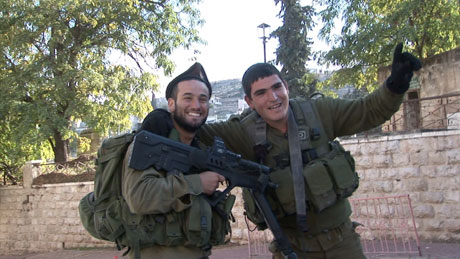
IDF soldiers pose for the camera on Shuhada St. in Hebron, Occupied West Bank.
LT: You effectively present the occupation as a systemic problem. One person in the movie notes, “You cannot be a “nice” occupier.” What do you see as the stages to addressing and solving this systemic problem?
DZ: Right, that was Yehuda Shaul from Breaking the Silence, a former IDF soldier who served in Hebron during the Second Intifada. The actual line is: “You cannot make me a 'nice' occupier.” And by his own admission – not to speak for him, but I think he'd characterize it as such – he wasn't, even though he came from the left-side of Israeli society and thought he could be the measured, “good” soldier – as probably most young Israelis do.
But as you mentioned, it's systemic. There aren't necessarily stages in addressing the problem. That's the whole point of the quote above – no matter how nice a soldier is at a checkpoint, the job is still to hold a gun, treat everyone as a potential threat, and restrict the movement of another people, and no amount of pleasantries will change that. The problem is the occupation – and, until it ends, these problems will persist.
Once that happens, then there are many stages that will probably have to take place if Israelis want to demilitarize their society. We can look at it in similar terms to physical and psychological separation as we discussed above, except this time encourage it. Physically, the military needs to be separated from civil society. It needs to separate itself from the education system. Its censors need to stop their checks on the media. Its officers need to disengage from the civil political sphere, as well as from the business world. Its economy needs to shift away from the defense industry. These are all concrete steps, and very clear ones, that would have to take place. But as a huge start, conscription should end. Whether it's Israel, Egypt, Syria, or wherever: when there is conscription, the military and its culture play an unhealthy role in society – even more unhealthy than usual.
And all of those physical separations are at the basis of the mental shift that would have to take place. Conscription, education, a quiescent media, etc. – all of this creates a certain mentality that generally exists throughout Israel and is commented on in OHNF. Additionally, a closer look at history and the role of Zionism, its followers and their actions in the past and present is also needed. There needs to be some serious introspective reflection on the above and how to move beyond it – on both sides, for certain, but especially the Israeli – if there's to be any hope for coexistence in Israel/Palestine. But Israelis are going to have to want to do this for this transformation to take place.
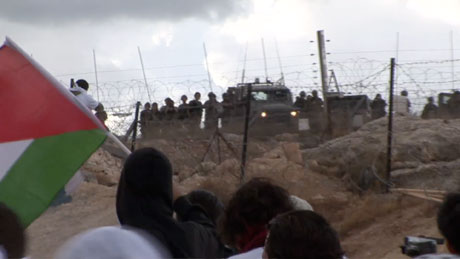
The weekly demonstration of Palestinians, Israelis, and internationals against the wall and settlements meets the military in Bil'in, Occupied West Bank.
LT: What do you hope the impact of the film will be?
DZ: Positive, I hope. I want as many people as possible to see the documentary, but I really want people who will go into it disagreeing or people who are on the fence to see it. I want people whose opinion is only based on what they've heard in the mainstream media to see this film and see what's really happening on the ground, and to see that there's an alternative vision being proposed for Israel/Palestine. I think that a lot of people's opinion on this conflict is based on a lack of information, or misinformation. I want to present additional information and additional voices – Israeli and Palestinian – they may not have heard before that will inform their opinion.
Ironically, a common claim from pro-Israeli policy folks is that the film is anti-Semitic, will stoke hate against Jews, etc. – all the usual ways criticism of Israel is attacked. But one thing that I've routinely heard while screening the film is that it gives a positive depiction of Israeli Jews in that it shows there are Israelis standing up for their Palestinian neighbors, for human rights, for genuine coexistence. I think that's great. This film isn't about choosing sides, Israeli vs. Palestinian; it's about looking at the facts and looking for a new way forward for everyone involved.
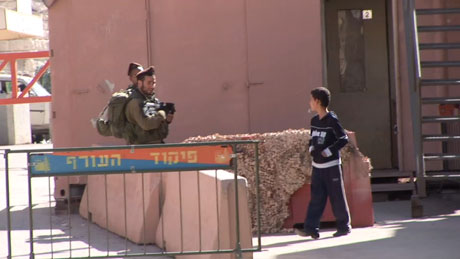
A young Palestinian makes his way through an Israeli checkpoint in Hebron, Occupied West Bank.
LT: Please tell our readers how and where they can see the film.
DZ: Hopefully in a theater near you! No, probably not …
Realistically, if you want to see it you can go to my website (www.UpheavalProductions.com). There you can order a DVD as well as view a preview and check out my previous projects. I've toured with the film throughout California, the Pacific Northwest, and the East Coast. There are additional screenings coming up and you can check to see if there's a date in your area here. If you're interested in organizing a screening, you can contact us through our website and we'll do our best to help in any way we can.
I'm trying to get the film out to as wide an audience as possible, so tell your friends!
LT: Thank you, David Zlutnick
Media that fights fascism
Truthout is funded almost entirely by readers — that’s why we can speak truth to power and cut against the mainstream narrative. But independent journalists at Truthout face mounting political repression under Trump.
We rely on your support to survive McCarthyist censorship. Please make a tax-deductible one-time or monthly donation.
